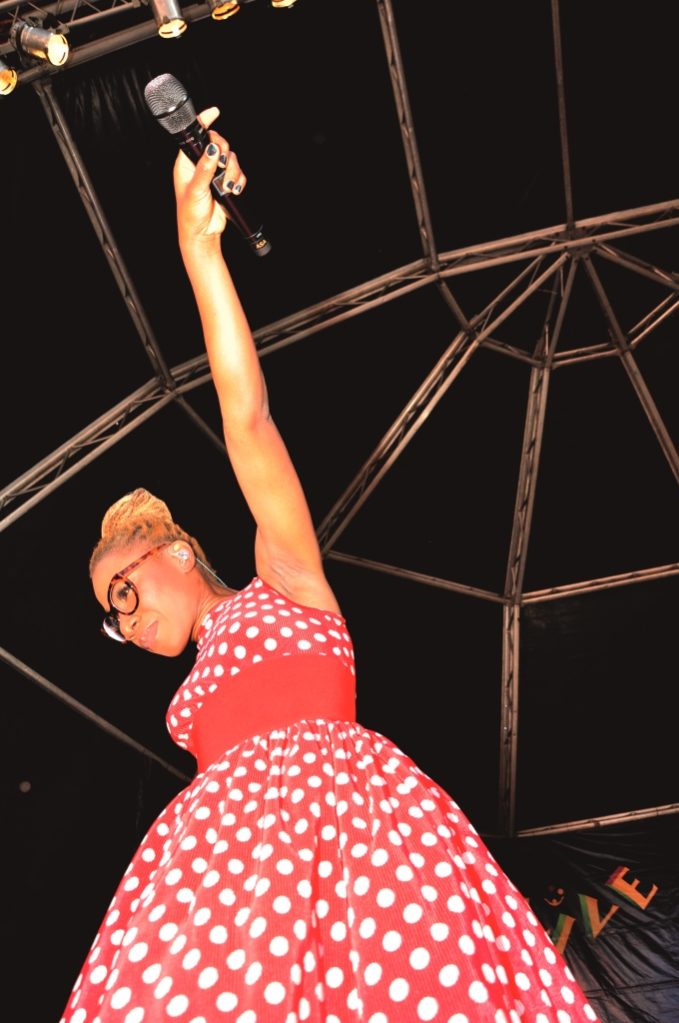Record breaking albums; sold out concerts; endorsement deals worth millions and screaming fans. This is the stuff dreams are made of, but in this day and age Africans are finding it elusive.

Asa at Arts Alive, Johannesburg
Many young hopefuls fall for the allure of the music industry. They want to be the next Lady Gaga, 30 Seconds To Mars or Lil Wayne. Unfortunately, very few will make it and even those who do will find the cold reality that Africa’s mighty music market, South Africa, is not as lucrative as its American counterpart.
The reason? It is a small market, plagued by lagging technology and mismanagement.
The global economic downturn has hit industry sales. According to the Recording Industry of South Africa (RiSA), sales dropped by 6.9% between 2009 and 2010 and 14.7% between 2008 and 2010.
Loading...
An artist who appears to have bucked this trend is newcomer, Zahara, a guitarist and vocalist from a small town near East London in South Africa’s Eastern Cape. She made news when it was reported that her debut album, Loliwe, sold more than 100,000 copies in just 19 days.
With the market where it is, the sceptics scoffed and there were whispers of cooked numbers. Zahara is managed by TS Records and distribution is handled by EMI Music.
Tyson Mqomo, a manager at EMI, refutes these allegations.
“We were also taken by surprise, but this has happened before, we did not make this up,” he says.
No matter how many Zahara sells, album sales alone will not sustain a music career or pay for lavish lifestyles, according to Clive Hardwick of Bula Music.
Hardwick has simplified the maths. If you have a compact disc (CD) that retails for $10, the retailer keeps 35% and pays the remaining 65% to the distributor. This wholesale price of $6.50 is divided up even further. Six per cent is for the manufacturing, 10-20% is kept by the distributor, and an artist could earn anywhere around 15%, depending on their contract. Five per cent pays for the producer and 6.76% is allocated for copyright. In the end the record label receives anywhere between 25% and 30%.
The average recording cost is $7, 269 and making a music video, marketing and CD sleeves pushes up expenses further.
There are currently around 1,500 record companies registered with RiSA, these include the big boys; Sony Music, Universal Music, EMI and Gallo Records. An estimated 50% of South African music releases come from these major recording companies. Across all recording mediums, 2010 sales in South Africa reached $43,770,901 for homegrown music; against $51,178,161 for international music.
The numbers don’t lie. It’s clear that there isn’t enough money going around. However, there are alternative sources of income. It just takes selling power, but unfortunately that does not come with star power.
John Langford, CEO of Big Concerts, says live performances are “the bread and butter”. FORBES AFRICA investigated how much. A certain hip-hop group asks anywhere between $3,632 and $9,685 for South African performances and $15,000 internationally. A South African male RnB singer earns $4,843 per performance and a songstress recently charged $11,637 for performing at an awards show.
To make matters worse, a good recording artist does not necessarily make a bankable performer. If you thought that local artists rake it in as supporting acts for visiting big shots, think again. The worldwide industry norm is that the locals sing for free, or even pay promoters for the privilege. This is known as “tour support” in Europe and it is the price you pay for a link with a big name.
Endorsements, sponsorships and merchandising can help boost profiles and bank accounts, only if managers are busy and sell their artists. Look at Lira, The Parlotones and HHP in South Africa.
Unimaginative management is not the only problem hampering the growth of the industry. Digitally, Africa is behind the rest of the world. Most people do not have broadband and South Africa is yet to establish an iTunes equivalent. The continent’s studios are also technically not on par with the international ones, which is one reason one why African artists fly to the States and Europe to record an album. The recording fees fly with them.
Everyone in the industry that FORBES AFRICA spoke to feels that government has failed them in ensuring effective laws to fight piracy.
From Johannesburg to Lagos you will see them at the traffic lights. Ten dollars can get you 10 CDs on the street before they even hit the shelves. Every now and again the police will round up the traffic light buccaneers and confiscate the copies—in the time it takes to memorize a Chris Brown song, the guys are back selling on the streets.
The South African Copyright Act of 1978 states that; “You may not make a copy of a sound recording without the permission of the author.” The onus is on the author to prove that such permission was never given and that is the problem for artists.
FORBES AFRICA has contacted South Africa’s Department of Trade and Industry for comment, several times, but so far has had no response.
There is so much talent among African artists, surely a celebration of home grown music would help add scarce money to the pot. Hardwick says there are boundless opportunities for African musicians to collaborate and conquer continental markets.
“Africa has a very unique sound. What Africa needs is a focal point for the African music industry,” he says.
For now, there are two lessons to be learnt. First, do not get into the music industry for the money. Second, an artist worth a buck needs a big hit and a hardworking team around them. If it were that simple everyone would be making money.
Loading...
